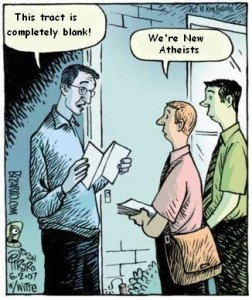- ABOUT
- ARGUMENTS – EXISTENCE OF GOD
- The Argument from Contingency
- Cosmological Argument
- Moral Argument
- Ontological Argument
- Teleological/Design/Fine-tuning Argument
- Pascal’s Wager
- The Argument from Religious Experience
- The Argument from Miracles
- The Argument from Consciousness
- The Argument from Truth
- The Argument from Desire
- The Argument from Aesthetic Experience
- HISTORICITY – RESURRECTION
- CHRISTIANITY & ISLAM
- APOLOGETICS
Jesus rose from the dead. That is certainly the principal belief that propelled the spread of the Christian faith across the Roman Empire, inspiring thousands who persisted in that belief in the face of either a martyr’s death or loss of fortune or even family. Had these early Christians not believed in the resurrection of Jesus, it is almost certain that Christianity would not exist today, because it would never have existed at all.
So, why did the early disciples of Jesus Christ believe in His resurrection? Is the resurrection of Jesus historical? For further reading, here
In one of his letters, CS Lewis repeats the story of an earnest atheistical school teacher instructing her young charges that all forms of animal life derived from the higher apes, under the impression that she was teaching them Darwinism. The anecdote is probably too good to be true, but it is a reminder that in any decently reasonable argument it helps to know what exactly it is that is being attacked or defended. Anyone writing off Darwinism on the grounds that the unfortunate teacher’s nonsense was what Darwinists “really” believed would not even begin to engage with Darwin’s views; there has to be some genuine attention to what is being said and to what it is like to hold it to be true – not what it feels like (though that may help) but how it “works”, what connections it sets up, what new twists it may give to familiar vocabulary, what new words and patterns of concepts it actually generates. For complete article, here
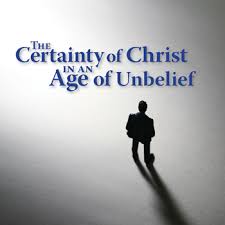 Those of us who are working within the branch of Christian theology known as “apologetics,” often have a rugged hill to climb in clarifying the purpose and goal of apologetics in evangelism to those within the Church, and thereby, convincing the ‘skeptics’ within the Church of its value and place within the evangelistic framework. I have often found it somewhat perplexing that the skepticism within the Church is at times stronger than that of the skeptics whom we engage outside the Church, as many skeptics, agnostics, and even atheists see the arguments and evidence for the Christian faith as a strong and viable challenge to their worldview, one in which they expend great effort to try and refute.
Those of us who are working within the branch of Christian theology known as “apologetics,” often have a rugged hill to climb in clarifying the purpose and goal of apologetics in evangelism to those within the Church, and thereby, convincing the ‘skeptics’ within the Church of its value and place within the evangelistic framework. I have often found it somewhat perplexing that the skepticism within the Church is at times stronger than that of the skeptics whom we engage outside the Church, as many skeptics, agnostics, and even atheists see the arguments and evidence for the Christian faith as a strong and viable challenge to their worldview, one in which they expend great effort to try and refute.
The resistance to apologetics can be summed up in the statement, “you can’t argue someone into the Kingdom.” I agree wholeheartedly, but with strong qualifications. These qualifications have been expressed by Greg Koukl who states:
“When people say you can’t argue anyone into the kingdom, they usually have an alternative approach in mind. They might be thinking that a genuine expression of love, kindness, and acceptance, coupled with a simple presentation of the gospel, is a more biblical approach. If you are tempted to think this way, let me say something that may shock you: You cannot love someone into the kingdom. It can’t be done. In fact, the simple gospel itself is not even adequate to do that job. How do I know? Because many people who were treated with sacrificial love and kindness by Christians never surrendered to the Savior. Many who have heard a clear explanation of God’s gift in Christ never put their trust in him…Here’s the key principle: Without God’s work, nothing else works; but with God’s work, many things work. Under the influence of the Holy Spirit, love persuades. But with the power of God the gospel transforms. And with Jesus at work, arguments convince. God is happy to use each of these methods.” [1]
In an interview with John D. Martin, William Lane Craig addresses the criticisms of apologetics and presents the biblical position and support of apologetics and its relevance to Christian evangelism today:
Boundless: And now, on the “Charismatic and Pentecostal’s Advocate” question: I have many friends and acquaintances who are in churches like Assemblies of God and Church of God in Christ, and they confront me sometimes when I talk about apologetics with the assertion that none of it matters. They say “Conversion is all the Holy Spirit. You’re never going to argue someone into the Kingdom, etc.” How do you respond to that sort of criticism?
Craig: What I say is, just as the Holy Spirit can use preaching, He can also use apologetics and arguments to draw someone to Himself. The key here is to realize that the Holy Spirit uses means. He uses means by which to draw people to Himself. There’s no reason to think that He can’t use argument and evidence, just as much as preaching. When you look at the book of Acts, that’s exactly the way Paul operated. He would argue with people. He would hold lectures in the hall of Tyrannus. He would discuss these things with the philosophers on Mars Hill. I find, in dealing with people from a Charismatic or Pentecostal background, that the most effective thing to do is simply to let them see you use arguments in evangelism. And they get excited. It’s only because they haven’t seen it done effectively that they’re skeptical. I just came from a large Assemblies of God Church in Edmonton, Canada, a couple of weeks ago, where we had over 900 people in the 20-some age range. I spoke of the absurdity of life without God, and they just ate it up. You can’t just go on emotions and be a whole person. Even folks in this sub-culture of Charismatic and Pentecostal Christianity have minds that want answers. When they see it in action, coupled with passionate commitment to Christ, they love it, too. They really eat it up. [2]
Craig: What I say is, just as the Holy Spirit can use preaching, He can also use apologetics and arguments to draw someone to Himself. The key here is to realize that the Holy Spirit uses means. He uses means by which to draw people to Himself. There’s no reason to think that He can’t use argument and evidence, just as much as preaching. When you look at the book of Acts, that’s exactly the way Paul operated. He would argue with people. He would hold lectures in the hall of Tyrannus. He would discuss these things with the philosophers on Mars Hill. I find, in dealing with people from a Charismatic or Pentecostal background, that the most effective thing to do is simply to let them see you use arguments in evangelism. And they get excited. It’s only because they haven’t seen it done effectively that they’re skeptical. I just came from a large Assemblies of God Church in Edmonton, Canada, a couple of weeks ago, where we had over 900 people in the 20-some age range. I spoke of the absurdity of life without God, and they just ate it up. You can’t just go on emotions and be a whole person. Even folks in this sub-culture of Charismatic and Pentecostal Christianity have minds that want answers. When they see it in action, coupled with passionate commitment to Christ, they love it, too. They really eat it up. [2]
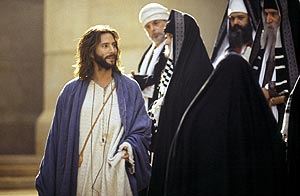 To hold to the position that apologetics—arguments/evidence—have no place in Christian evangelism, and that of helping to bring a soul to the saving knowledge of Christ, is to deny Jesus’ evangelistic methodology and to discount the entire apologetic methodology used throughout the Acts of the Apostles. I will offer several examples to illustrate my point.
To hold to the position that apologetics—arguments/evidence—have no place in Christian evangelism, and that of helping to bring a soul to the saving knowledge of Christ, is to deny Jesus’ evangelistic methodology and to discount the entire apologetic methodology used throughout the Acts of the Apostles. I will offer several examples to illustrate my point.
The following example, of which there are many, of the use of logic in argument by Jesus is taken from the excellent article by Douglas Groothuis, Jesus: Philosopher and Apologist:
Jesus was fond of what are called a fortiori (Latin: “from the stronger”) arguments, which often appear in pithy but persuasive forms in the Gospels.15 We use them often in everyday arguments. These arguments have the following form:
1. The truth of idea A is accepted.
2. Support for the truth of idea B (which is relevantly similar to idea A) is even stronger than that of idea A.
3. Therefore, if the truth of idea A must be accepted, then so must the truth of idea B be accepted.
Consider Jesus’ argument against the Pharisees concerning the rightness of His performing a healing miracle on the Sabbath:
I did one miracle [on the Sabbath], and you are all astonished. Yet, because Moses gave you circumcision (though actually it did not come from Moses, but from the patriarchs), you circumcise a child on the Sabbath. Now if a child can be circumcised on the Sabbath so that the law of Moses may not be broken, why are you angry with me for healing the whole man on the Sabbath? Stop judging by mere appearances, and make a right judgment. (John 7:21–24)
Jesus’ argument can be laid out simply:
1. The Pharisees endorse circumcision, even when it is done on the Sabbath, the day of rest from work. (Circumcision was performed eight days after the birth of a male, which sometimes fell on the seventh day of the week, the Sabbath.) This does not violate the Sabbath laws, because it is an act of goodness.
2. Healing the whole person is even more important and beneficial than circumcision, which affects only one aspect of the male.
3. Therefore, if circumcision on the Sabbath is not a violation of the Sabbath, neither is Jesus’ healing of a person on the Sabbath.
Jesus’ concluding comment, “Stop judging by appearances, and make a right judgment,” was a rebuke to their illogical inconsistency while applying their own moral and religious principles. [3]
In his excellent article, The Apologetics of Jesus: Survey and Significance, Norman Geisler covers the nine different ways in which Jesus used apologetics effectively in His witness:
Jesus engaged people apologetically in at least nine different ways. Each way fit the occasion and audience. It was contextualized apologetics. He knew precisely what would be effective with His listeners, and He used apologetics masterfully to persuade them of the truth He was presenting. (I highly recommend Dr. Geisler’s journal article and book, The Apologetics Of Jesus: A Caring Approach to Dealing with Doubters by Norman Geisler and Patrick Zukeran)
Moving on to the Apostle Paul; who routinely reasoned and/or argued with people wherever he went, I would like to focus upon his time in Athens and his presentation to the Epicurean and Stoic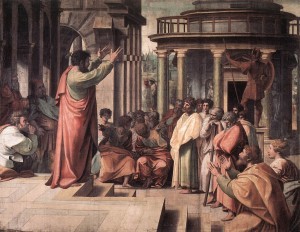 philosophers. We pick up the story with Paul conducting his street, or should I say, marketplace ministry:
philosophers. We pick up the story with Paul conducting his street, or should I say, marketplace ministry:
So he reasoned in the synagogue with the Jews and the devout persons, and in the marketplace every day with those who happened to be there. Some of the Epicurean and Stoic philosophers also conversed with him. And some said, “What does this babbler wish to say?” Others said, “He seems to be a preacher of foreign divinities”—because he was preaching Jesus and the resurrection. (Acts 17:17-18 ESV)
The Greek word for reasoned is dialegomai, whose definition is:
to think different things with one’s self, mingle thought with thought
to ponder, revolve in mind
to converse, discourse with one, argue, discuss
to ponder, revolve in mind
to converse, discourse with one, argue, discuss
Luke accurately described Paul’s evangelistic methodology by using the word dialegomai: that of reasoning, entering into dialogue, to converse, argue or discuss. Paul additionally attempted to “persuade” (Greek: peitho) his hearers to accept the truth and many did respond this way. This word describes the attempt to change a person’s mind by the application of reason and also involves endeavoring to prevail in the discussion by winning them to one’s viewpoint. [4] Paul combines both a classical and an evidential apologetic, one that employs reason and fact, and is both rational and empirical. Throughout his evangelistic outreach, Paul employed what has been referred to as a resurrection apologetic. Every one of his witnessing presentations was an apologia for the resurrection.
It is obvious when studying Paul’s address at the Areopagus, that Luke captured a text book example of “being always ready to make a defense to anyone who asks you for the reason of the hope that is in you, doing so with gentleness and respect.” (1 Peter 3:15) Peter May offers the following ‘bullet points’ that can be found within Paul’s presentation found in Acts 17:
Introductory compliments, verse 22
The unknown God, verse 23
The transcendent Creator, verse 24
The sustaining God, verse 25
Human unity and equality, verse 26
Seeking and finding, verse 27
The immanence of God, verses 27, 28
Man made in his likeness, verse 29
Morally accountable, verse 30
Righteous judgment by the risen Christ, verse 31 [5]
The unknown God, verse 23
The transcendent Creator, verse 24
The sustaining God, verse 25
Human unity and equality, verse 26
Seeking and finding, verse 27
The immanence of God, verses 27, 28
Man made in his likeness, verse 29
Morally accountable, verse 30
Righteous judgment by the risen Christ, verse 31 [5]
 It is my prayer that the Lord will add to the church daily, such as will answer the call of adding apologetics to their evangelistic approach. It is biblical, and it was how the Christian faith was born, from Peter’s first sermon at Pentecost, (Acts 2:14-40) to Stephen’s farewell sermon, (Acts 7) to Paul’s defense before Felix and King Agrippa, (Acts 24:10-21; 26:2-23). Let us carry on in the tradition of those who have gone before us, looking unto Jesus, the author and finisher of our faith.
It is my prayer that the Lord will add to the church daily, such as will answer the call of adding apologetics to their evangelistic approach. It is biblical, and it was how the Christian faith was born, from Peter’s first sermon at Pentecost, (Acts 2:14-40) to Stephen’s farewell sermon, (Acts 7) to Paul’s defense before Felix and King Agrippa, (Acts 24:10-21; 26:2-23). Let us carry on in the tradition of those who have gone before us, looking unto Jesus, the author and finisher of our faith.
“The object of apologetics is not to antagonize or humiliate those outside the church, but to help open their eyes to the reality, reliability, and relevance of the Christian faith…Apologetics is about persuading people that there is a door to another world–a door that perhaps they never realized existed. Evangelism is about helping people to open that door and enter into the new world that lies beyond.”–Alister E. McGrath, Mere Apologetics
Are Evangelism and Apologetics Complimentary?–One Minute Apologist
Bobby answers whether or not evangelism and apologetics can help one another.
What is the Role of Apologetics in Evangelism–William Lane Craig
A special HBU Convocation featuring a discussion between William Lane Craig and Lee Strobel on the campus of Houston Baptist University.
Resources:
[1] Greg Koukl, Tactics, Zondervan, 2009, pg. 36
[2] William Lane Craig, Interview with John D. Martin, Boundless, http://www.reasonablefaith.org/a-few-minutes-with-dr-william-lane-craig-interview-by-john-d-martin#ixzz42h2zseyC
[3] Douglas Groothuis, Jesus: Philosopher and Apologist, http://www.equip.org/article/jesus-philosopher-and-apologist/
[4] Gary R. Habermas, The Resurrection of Jesus, pg. 172, 1984
[5] Peter May, Paul at Athens, http://www.bethinking.org/apologetics/paul-at-athens
During his imprisonment and torture in an Iranian jail, Pastor Saeed Abedini continued to evangelize, helping to convert 10 inmates from Islam to Christianity during his first year in captivity, he said.
“Ten of the prisoners turned to Christ the first year, so the prison found out, the intelligent police found out, and they moved me to another prison where the situation was worse,” Abedini told CBN Thursday.
By relocating Abedini, his captors were unknowingly helping to spread the seeds of the Gospel. “Every time they changed my prison, it was a good time to evangelize,” said the pastor. Complete article here
When it comes to helping refugees, Protestant churches and their pastors are often separated by faith and fear.
Most pastors say Christians should lend a hand to refugees and foreigners, and most believe caring for refugees is a privilege.
But pastors also say their churches are twice as likely to fear refugees as they are to help them, according to a new survey from LifeWay Research.
“Pastors believe Scripture tells Christians to care for refugees and foreigners,” said Ed Stetzer, executive director of the Nashville-based organization. “Yet many admit their church is not involved in such ministry.” Complete article, here
Hundreds of thousands of Christians are worshiping secretly in a rapidly accelerating house church movement in Iran, as a London-based theological center is aiding the movement by training the next generation of its spiritual leaders.
The Iranian government labels Christianity as a threat to the nation’s Islamic identity and imprisons over 100 Christians for worshiping Christ. Such crackdowns on faith, however, have not prevented Iranian house churches from blossoming into a movement too big for the Iranian religious police to contain.
Some estimates, such as one provided by Open Doors USA, record as many as 450,000 practicing Christians in Iran, while other, more optimistic estimates, record over 1 million Christians in the Islamic republic. Complete article, here
I am working my way through David Berlinski’s, The Devils’ Delusion—Atheism and It’s Scientific Pretensions, which is a refutation to Richard Dawkins’ book, The God Delusion. This is a brilliant, incisive, and funny book which explores the limits of science and the pretensions of those who insist it can be—indeed must be—the ultimate touchstone for understanding our world and ourselves. Although Dr. Berlinski refers to himself as a “secular Jew,” he offers a biting defense of religious thought within the pages of The Devil’s Delusion.
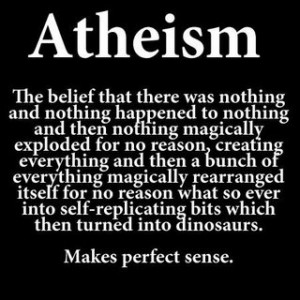 Berlinski takes point blank aim at Dawkins and his atheist worldview, and gives them both a well-deserved shot:
Berlinski takes point blank aim at Dawkins and his atheist worldview, and gives them both a well-deserved shot:
“Atheism is the schwerpunkt, as German military theorist used to say with satisfaction, the place where force is concentrated and applied; and what lies behind is a doctrinal system, a way of looking at the world, and so an ideology. It is an ideology with no truly distinct center and the fuzziest of boundaries. For purposes of propaganda it hardly matters. Science as an institution is unified by the lowest common denominator of belief, and that is the conviction that science is a very good thing.” (pg. 6)
Berlinski does not shy away from calling out some of the leading scientists of our day as to the incoherent ideology of atheism and Darwinian evolution that they espouse. In reference to Richard Dawkins, Berlinski states:
“He is as responsive to criticism as a black hole in space. “It is absolutely safe to say,” Dawkins remarked, “that if you meet somebody who claims not to believe in evolution that person is ignorant, stupid or insane.” (pg. 7)
This is confirmed in Dawkins book, River Out of Eden, where he reaffirms his position:
‘The universe we observe has … no design, no purpose, no evil and no good, nothing but blind, pitiless indifference. … DNA neither knows nor cares. DNA just is. And we dance to its music.’ (pg. 133)
When I first read the above quotes by Dawkins, my first thought was, “how original.” (Sarcasm intended.) We need not look to far back to find the same ideology being espoused (almost verbatim) by none other than Bertrand Russell in his essay, “A Free Man’s Worship” (1903):
That Man is the product of causes that had no prevision of the end they were achieving; that his origin, his growth, his hopes and fears, his loves and his beliefs, are but the outcome of accidental collocations of atoms; that no fire, no heroism, no intensity of thought and feeling, can preserve individual life beyond the grave; that all the labors of the ages, all the devotion, all the inspiration, all the noonday brightness of human genius, are destined to extinction in the vast death of the solar system, and that the whole temple of Man’s achievement must inevitably be buried beneath the debris of a universe in ruins – all these things, if not quite beyond dispute, are yet so nearly certain that no philosophy which rejects them can hope to stand. Only within the scaffolding of these truths, only on the firm foundation of unyielding despair, can the soul’s habitation henceforth be safely built.
In a March, 2006 interview, Berlinski compares Dawkins brand of atheism with that of Bertrand Russell:
Jonathan Witt:…You do not, I gather, think much of the kind of atheism Dawkins is concerned to promote…
David Berlinski: It’s pretty much the sort of stuff Bertrand Russell used to put out when he needed to knock-off a popular best-seller or dazzle one of his mistresses. “You see, my dear, belief in god is no better than belief in a teacup orbiting Mars, whereupon my dear would generally begin loosening her undergarments.” The fact is that these kinds of arguments have been known to embarrass a wart hog.
Then Berlinski moves on to Peter Atkins, professor of physical chemistry at Oxford University:
“Peter Atkins…is ardent in his atheism. In the course of denouncing not only theology but poetry and philosophy as well, he observes favorably of himself that scientists “are at the summit of knowledge, beacons of rationality, and intellectually honest.” It goes without saying, Atkins adds, that “there is no reason for suppose that science cannot deal with every aspect of existence.” Science is, after all, “the apotheosis of the intellect and the consummation of the Renaissance.” These comical declarations may be abbreviated by observing that Atkins is persuaded that not only is science a very good thing, but no other thing is good at all.” (pg. 7)
As an example of the “comical declarations” highlighted by Berlinski, I’ve included the following clip from the debate between William Lane Craig and Peter Atkins:
The Devil’s Delusion is a tour de force by Berlinski, in which he turns the scientific community’s cherished skepticism back on itself, daring to ask and answer some rather embarrassing questions:
Has anyone provided a proof of God’s inexistence? Not even close.
Has quantum cosmology explained the emergence of the universe or why it is here? Not even close.
Have the sciences explained why our universe seems to be fine-tuned to allow for the existence of life? Not even close.
Are physicists and biologists willing to believe in anything so long as it is not religious thought? Close enough.
Has rationalism in moral thought provided us with an understanding of what is good, what is right, and what is moral? Not close enough.
Has secularism in the terrible twentieth century been a force for good? Not even close to being close.
Is there a narrow and oppressive orthodoxy of thought and opinion within the sciences? Close enough.
Does anything in the sciences or in their philosophy justify the claim that religious belief is irrational? Not even ballpark.
Is scientific atheism a frivolous exercise in intellectual contempt? Dead on.
Berlinski does not dismiss the achievements of western science. The great physical theories, he observes, are among the treasures of the human race. But they do nothing to answer the questions that religion asks, and they fail to offer a coherent description of the cosmos or the methods by which it might be investigated.
This book may not bring someone to belief in Christ and cause them to embrace the Christian worldview, but it will cause the unbeliever, whether atheist, sceptic or agnostic, to pause and think critically about their worldview, which hopefully will bring them to consider a careful and critical examination of the evidence for the Christian worldview–an examination that will hopefully lead them to a saving knowledge of the eternal Word of God—Jesus Christ.
 In the beginning, God created the heavens and the earth…In the beginning was the Word, and the Word was with God, and the Word was God. He was in the beginning with God. All things were made through him, and without him was not any thing made that was made. (John 1:1-3 ESV)
In the beginning, God created the heavens and the earth…In the beginning was the Word, and the Word was with God, and the Word was God. He was in the beginning with God. All things were made through him, and without him was not any thing made that was made. (John 1:1-3 ESV)
I recently attended a Christian-Muslim dialogue event in which a Muslim man presented the Islamic position regarding “Prophethood According to the Qur’an.” One of the points he made was that “prophets must be sinless—as in free from intentional sins, especially major sins like idolatry, murder of innocents, rape, drunkenness, etc.” (this is a direct quote from his handout.) As the Qur’an is quite clear as to Isa (Jesus) being the only sinless prophet, I was a bit surprised at the position he was taking. However, after researching the topic further, it became quite clear that the ‘sinless prophets’ tradition, referred too as Isma in the Islamic literature, is just that, a tradition that was developed outside the teachings of the Qur’an and the hadith. So, you may be asking, why was it developed and what are its origins? Please read on for the answers to these questions. (Much of the following material is excerpts from articles found at: http://answering-islam.org I highly recommend this site for those engaged in Christian-Muslim dialogue.)
This later development of the “sinless prophets” tradition, or what is known as isma, is one that relates to the 25 prophets named in the Qur’an. Throughout the Muslim world today it is generally believed that all of the prophets enjoyed an isma, a protection against sin, and that they were accordingly sinless. This is yet another one of the many inconsistencies and/or contradictions within Islamic theology. As we’ll see from the following Islamic resources, isma has been developed, established and maintained against the plain teaching of the Qur’an and Hadith.
The orthodox belief is that the prophets do not commit sin, and are sinless (ma’sum), but this dogma contradicts various statements of the Qur’an and of Muhammad as recorded in the Traditions. (Klein, The Religion of Islam, p. 109)
 There are basically two reasons for the rise of this doctrine in Islam. Firstly, the early Muslims soon discovered that the Bible taught plainly that Jesus was the only sinless man that ever lived and, confronted with this evidence, deemed it necessary to invent the fiction that all the prophets, with special emphasis on Muhammad, were sinless as well. A superiority of Jesus over Muhammad could not be tolerated and, just as miracles were attributed to the figurehead of Islam to give him a status at least equal to that of Jesus, so he was also held to be sinless for the same purpose.
There are basically two reasons for the rise of this doctrine in Islam. Firstly, the early Muslims soon discovered that the Bible taught plainly that Jesus was the only sinless man that ever lived and, confronted with this evidence, deemed it necessary to invent the fiction that all the prophets, with special emphasis on Muhammad, were sinless as well. A superiority of Jesus over Muhammad could not be tolerated and, just as miracles were attributed to the figurehead of Islam to give him a status at least equal to that of Jesus, so he was also held to be sinless for the same purpose.
Secondly, the doctrine of revelation in Islam holds that the scriptures were dictated directly to the prophets by the intermediary angel (Gabriel) and it was therefore believed that the prophets must have possessed an impeccable character for, if they could not keep themselves from error in their personal lives, how could they be trusted to communicate God’s revelations without error? This latter presupposition led perforce to the conclusion that the prophets must have been sinless.
Let’s first look at the what the Islamic sources say about Jesus’ sinlessness, a position that was held by Muslims until the time that isma was introduced:
Remember when a women of Imran said, ‘My Lord, I have vowed to Thee what is in my womb to be dedicated to Thy service. So do Thou accept it of me; Verily Thou alone art All-Hearing, All-Knowing.’ But when she was delivered of it, she said, ‘My Lord, I am delivered of a female,’ – and ALLAH knew best of what she was delivered and the male she desired to have was not like the female she was delivered of – ‘and I have named her Mary, and I commit her and her offspring to Thy protection from Satan, the rejected.’ S. 3:35-36 Sher Ali
The ahadith record Muhammad as interpreting the preceding passage to mean that Mary and her Son were the only ones whom Satan was unable to touch:
Narrated Said bin Al-Musaiyab:
Abu Huraira said, “I heard Allah’s Apostle saying, ‘There is none born among the off-spring of Adam, but Satan touches it. A child therefore, cries loudly at the time of birth because of the touch of Satan, EXCEPT MARY AND HER CHILD.” Then Abu Huraira recited: “And I seek refuge with You for her and for her offspring from the outcast Satan” (3.36) (Sahih Al-Bukhari, Volume 4, Book 55, Number 641; see also Volume 4, Book 54, Number 506)Abu Huraira reported Allah’s Messenger (may peace be upon him) as saying: No child is born but he is pricked by the satan and he begins to weep because of the pricking of the satan EXCEPT THE SON OF MARY AND HIS MOTHER. Abu Huraira then said: You may recite if you so like (the verse):” I seek Thy protection for her and her offspring against satan the accursed” (iii. 36). This hadith has been narrated on the authority of Zuhri with the same chain of transmitters (and the words are):” The newborn child is touched by the satan (when he comes in the world) and he starts crying because of the touch of satan.” In the hadith transmitted on the authority of Shu’aib there is a slight variation of wording. (Sahih Muslim, Book 030,Number 5837)Abu Huraira reported Allah’s Messenger (may peace be upon him) as saying: The satan touches every son of Adam on the day when his mother gives birth to him WITH THE EXCEPTION OF MARY AND HER SON. (Sahih Muslim, Book 030,Number 5838; see also Book 033, Number 6429)
It is evident from the foregoing that Muhammad not only is said to have believed in Jesus’ sinlessness, but in Mary’s as well. The next hadith supports this view:
Narrated Abu Musa:
Allah’s Apostle said, “Many amongst men reached (the level of) perfection but none amongst the women reached this level except Asia, Pharaoh’s wife, AND MARY, THE DAUGHTER OF ‘IMRAN. And no doubt, the superiority of ‘Aisha to other women is like the superiority of Tharid (i.e. a meat and bread dish) to other meals.” (Sahih Al-Bukhari, Volume 4, Book 55,Number 623; see also Volume 5, Book 57, Number 113)
Ibn Kathir writes:
“… And I seek refuge with You for her and for her offspring from Shaytan, the outcast.”—means, that she sought refuge with Allah from the evil of Shaytan, for her and her offspring, i.e., `Isa, peace be upon him. Allah accepted her supplication, for `Abdur-Razzaq recorded that Abu Hurayrah said that the Messenger of Allah said …Every newly born baby is touched by Shaytan when it is born, and the baby starts crying because of this touch, except Maryam and her son.Abu Hurayrah then said, “Read if you will …
And I seek refuge with You for her and for her offspring from Shaytan, the outcast.” The Two Sahihs recorded this Hadith. (Commentary on 3:36; online edition)
And I seek refuge with You for her and for her offspring from Shaytan, the outcast.” The Two Sahihs recorded this Hadith. (Commentary on 3:36; online edition)
Here is the other passage that points to Jesus’ sinlessness:
He said: I am only a messenger of your Lord: That I will give you a pure boy (ghulaman zakiyyan). S. 19:19 Shakir
One thing is for certain–the conclusion that Jesus was sinless stems from a careful examination of both the Quran and the Islamic traditions.
Furthermore, Jesus is the only person specifically said to be blessed:
And hath made me blessed wheresoever I may be, and hath enjoined upon me prayer and almsgiving so long as I remain alive. S. 19:31
Christian author and evangelist Samuel Green rightly noted:
For every moment of his life Jesus was blessed. This Arabic word for blessed (mubaarak) is only used to describe Jesus and is never used for anyone else. But it is used elsewhere to describe things that the Qur’an considers perfect. Thus the Qur’an itself is called blessed (6:93, 156), the first house of prayer is called blessed (3:96), and the olive tree that provides oil for the likeness of the light of God is called blessed (24:35), but Jesus is the only person who is blessed in this perfect way. (The Perfect Man)
Thirdly, both the Quran and the ahadith deny that Muhammad was sinless:
Then have patience (O Muhammad). Lo! the promise of Allah is true. And ask forgiveness of thy sin, and hymn the praise of thy Lord at fall of night and in the early hours. S. 40:55 Pickthall
So know (O Muhammad) that there is no God save Allah, and ask forgiveness for thy sin and for believing men and believing women. Allah knoweth (both) your place of turmoil and your place of rest. S. 47:19 Pickthall
Lo! We have given thee (O Muhammad) a signal victory, That Allah may forgive thee of thy sin that which is past and that which is to come, and may perfect His favour unto thee, and may guide thee on a right path, S. 48:1-2 Pickthall
So know (O Muhammad) that there is no God save Allah, and ask forgiveness for thy sin and for believing men and believing women. Allah knoweth (both) your place of turmoil and your place of rest. S. 47:19 Pickthall
Lo! We have given thee (O Muhammad) a signal victory, That Allah may forgive thee of thy sin that which is past and that which is to come, and may perfect His favour unto thee, and may guide thee on a right path, S. 48:1-2 Pickthall
In Mecca, Mohammad receives this command about his sin:
Then have patience (O Muhammad). Lo! the promise of Allah is true. And ask forgiveness of thy sin [dh-n-b] and hymn the praise of thy Lord at fall of night and in the early hours. (Surah 40:55, Pickthall)
The Arabic word dhanaba (verb form) come from the root dh-n-b. How is dh-n-b defined? Is it only a small weakness? Merely a minor fault?
A Muslim scholar defines it thus: “Crime; Fault; Offence; Sin; Any act having an evil result” (Omar). A western scholar defines it as “a crime, fault, sin” (Penrice). Hence, the above ayahs are unambiguous-Muhammad was not sinless.
The final example of Muhammad’s sin comes from Sura 48, a Medinan chapter.
48:2 That Allah may forgive you your sins [dh-n-b] of the past and the future and complete His Favour on you, and guide you on the Straight Path . . . (Hilali and Khan)
This verse was probably revealed in 628, barely four years before he died of a fever in AD 632. Does this mean that the messenger of Allah had sin before AD 628? This seems to be the case. To be forgiven of dh-n-b, one must have it first.
And in Sahih Bukhari, Muhammad confirms his sinfulness and need for repenting:
Narrated Abu Huraira:
I heard Allah’s Apostle saying.” By Allah! I ask for forgiveness from Allah and turn to Him in repentance more than seventy times a day.” (Sahih Bukhari, Volume 8, Book 75, Number 319)
I heard Allah’s Apostle saying.” By Allah! I ask for forgiveness from Allah and turn to Him in repentance more than seventy times a day.” (Sahih Bukhari, Volume 8, Book 75, Number 319)
Fourthly, the following traditions clearly contrast the essential purity of the Lord Jesus from the sinfulness of Muhammad, as well as the other true prophets:
Some (cooked) meat was brought to Allah Apostle and the meat of a forearm was presented to him as he used to like it. He ate a morsel of it and said, “I will be the chief of all the people on the Day of Resurrection. Do you know the reason for it? Allah will gather all the human being of early generations as well as late generation on one plain so that the announcer will be able to make them all-hear his voice and the watcher will be able to see all of them. The sun will come so close to the people that they will suffer such distress and trouble as they will not be able to bear or stand. Then the people will say, ‘Don’t you see to what state you have reached? Won’t you look for someone who can intercede for you with your Lord’ Some people will say to some others, ‘Go to Adam.’ So they will go to Adam and say to him. ‘You are the father of mankind; Allah created you with His Own Hand, and breathed into you of His Spirit (meaning the spirit which he created for you); and ordered the angels to prostrate before you; so (please) intercede for us with your Lord. Don’t you see in what state we are? Don’t you see what condition we have reached?’ Adam will say, ‘Today my Lord has become angry as He has never become before, nor will ever become thereafter. He forbade me (to eat of the fruit of) the tree, but I disobeyed Him. Myself! Myself! Myself! (has more need for intercession). Go to someone else; go to Noah.’ So they will go to Noah and say (to him), ‘O Noah! You are the first (of Allah’s Messengers) to the people of the earth, and Allah has named you a thankful slave; please intercede for us with your Lord. Don’t you see in what state we are?’ He will say.’ Today my Lord has become angry as He has never become nor will ever become thereafter. I had (in the world) the right to make one definitely accepted invocation, and I made it against my nation. Myself! Myself! Myself! Go to someone else; go to Abraham.’ They will go to Abraham and say, ‘O Abraham! You are Allah’s Apostle and His Khalil from among the people of the earth; so please intercede for us with your Lord. Don’t you see in what state we are?’ He will say to them, ‘My Lord has today become angry as He has never become before, nor will ever become thereafter. I had told three lies (Abu Haiyan (the sub-narrator) mentioned them in the Hadith) Myself! Myself! Myself! Go to someone else; go to Moses.’ The people will then go to Moses and say, ‘O Moses! You art Allah’s Apostle and Allah gave you superiority above the others with this message and with His direct Talk to you; (please) intercede for us with your Lord Don’t you see in what state we are?’ Moses will say, ‘My Lord has today become angry as He has never become before, nor will become thereafter, I killed a person whom I had not been ordered to kill. Myself! Myself! Myself! Go to someone else; go to Jesus.’ So they will go to Jesus and say, ‘O Jesus! You are Allah’s Apostle and His Word which He sent to Mary, and a superior soul created by Him, and you talked to the people while still young in the cradle. Please intercede for us with your Lord. Don’t you see in what state we are?’ Jesus will say. ‘My Lord has today become angry as He has never become before nor will ever become thereafter. JESUS WILL NOT MENTION ANY SIN, but will say, ‘Myself! Myself! Myself! Go to someone else; go to Muhammad.’ So they will come to me and say, ‘O Muhammad ! You are Allah’s Apostle and the last of the prophets, AND ALLAH FORGAVE YOUR EARLY AND LATE SINS. (Please) intercede for us with your Lord. Don’t you see in what state we are?” The Prophet added, “Then I will go beneath Allah’s Throne and fall in prostration before my Lord. And then Allah will guide me to such praises and glorification to Him as He has never guided anybody else before me. Then it will be said, ‘O Muhammad Raise your head. Ask, and it will be granted. Intercede It (your intercession) will be accepted.’ So I will raise my head and Say, ‘My followers, O my Lord! My followers, O my Lord’. It will be said, ‘O Muhammad! Let those of your followers who have no accounts, enter through such a gate of the gates of Paradise as lies on the right; and they will share the other gates with the people.” The Prophet further said, “By Him in Whose Hand my soul is, the distance between every two gate-posts of Paradise is like the distance between Mecca and Busra (in Sham).” (Sahih Al-Bukhari, Volume 6, Book 60, Number 236)They would come to me and say: O Muhammad, thou art the messenger of Allah and the last of the apostles. Allah HAS PARDONED THEE ALL THY PREVIOUS AND LATER SINS … (Sahih Muslim, Book 001, Number 0378)
Note that Muhammad allegedly acknowledged that the major prophets (himself included) were sinners in need of forgiveness, with the Lord Jesus being the sole exception! This is perhaps why a Muslim like Qatadah (as reported by Al Tabari) could say:
“Jesus and his mother did not commit any of the sins which the rest of the children of Adam commit.” (Mahmoud M. Ayoub, The Quran and Its Interpreters: The House of Imran [State University of New York Press (SUNY), 1992], Volume II, p. 94)
What is ironic about the preceding hadiths is that instead of having the sinless Jesus intercede for others, the sinful Muhammad is granted the right of intercession, even though the other prophets are unable to intercede PRECISELY because they had sinned! To summarize the data we have gathered thus far, we find that both the Quran and the Islamic traditions mention specifically only three people who were sinless and pure: Jesus, his mother Mary, and John the Baptist.
As we can see, this later development of the doctrine of isma, was adopted without support of the Qur’anic or hadith sources. In his excellent book, The Gentle Answer-to the Muslim Accusation of Biblical Falsification, Gordon Nickel offers the following explanation as to the source of the late Islamic tradition of ‘isma’:
Since the doctrine of the sinlessness of prophets did not come from the Qur’an, from where did it come? Academic scholars have traced the doctrine to developments in the thinking of Shi’i writers in relation to their concept of the Imam. Shi’i writers wanted to claim a sinless state for their won leader. Paul Walker wrote, “One early Shi’i theologian even claimed that the imams had to be impeccable and infallible, despite the Prophet himself having been liable to a degree of sin as recognized and admitted by the Qur’an.” Among Sunni writers, “the dogma of the impeccability of the Prophets was perhaps for the first time formulated in the Fikh Akbarr ll.” Dr. Wensinck dated this work in the tenth century (fourth century of Islam). He also wrote, “We must suppose that [the dogma of prophetic sinlessness] arose out of the growing worship of Muhammad.” William Graham argued that the doctrine was developed to safeguard the Qur’an: “had the messenger not been divinely preserved from at least major sins, how could one be certain he did not make errors with regard to the reception and transmission of God’s sacred word?”
As demonstrated above, the sinlessness of all prophets is not a concept taught by the Qur’an. It should not be surprising, therefore, that the noun ‘isma (“sinlessness, infallibility”) does not appear in the Qur’an, nor does the common participle ma’sum (“immune, infallible, sinless”). Furthermore, the vocabulary of ‘isma does not appear in any of the collections of hadith accepted by Muslims as authoritative, and in fact, these canonical collections contain no trace of the sinlessness of prophets. Even the dogma of the sinlessness of the messenger of Islam is never mentioned explicitly in the canonical hadith.[1]
In regards to the Fikh Akbar ll mentioned in the proceeding paragraphs, under section, THE PROPHETS (UPON THEM BE PEACE), MUHAMMAD AND THE COMPANIONS, it states:
The prophets (upon them be blessings and peace) are all free from minor sins, enormities, unbelief, and wicked acts. However, some slips and mistakes have escaped them. Muhammad (saws) is Allah’s beloved, His servant, His Messenger, His Prophet, His chosen one, and His purified one. Never did he worship idols or partner anything with Allah even for a blink of an eye, nor did he ever commit a minor sin or enormity.
It is obvious that this statement is contradictory. It first states that “the prophets are all free from minor sins,” then concludes with, “nor did he [Muhammad] ever commit a minor sin or enormity,” by which the superiority of Muhammad is affirmed and as such, relegating all other prophets, including Isa/Jesus, as being inferior to Muhammad. Once again, this is a later tradition which has no backing in the Qur’an itself.
To reiterate,  the doctrine was adopted for two reasons:
the doctrine was adopted for two reasons:
Firstly, the early Muslims soon discovered that the Bible taught plainly that Jesus was the only sinless man that ever lived and, confronted with this evidence, deemed it necessary to invent the fiction that all the prophets, with special emphasis on Muhammad, were sinless as well. A superiority of Jesus over Muhammad could not be tolerated and, just as miracles were attributed to the figurehead of Islam to give him a status at least equal to that of Jesus, so he was also held to be sinless for the same purpose.
Secondly, the doctrine of revelation in Islam holds that the scriptures were dictated directly to the prophets by the intermediary angel (Gabriel) and it was therefore believed that the prophets must have possessed an impeccable character for, if they could not keep themselves from error in their personal lives, how could they be trusted to communicate God’s revelations without error? This latter presupposition led perforce to the conclusion that the prophets must have been sinless.
Only one sinless man has ever lived on this earth, that is the God-man, Jesus Christ. Both the Bible and the Qur’an attest to this fact. My dear Muslim brothers and sisters, I ask that you carefully study your own sources regarding Isa ibn Maryam, and after having done so, then study the Bible/New Testament (the Injil) with an open mind so that God may reveal His truth to you so that you may come to know Jesus and who He truly is–the Way, the Truth and the Life. (John 14:6)
For our sake he made him to be sin who knew no sin, so that in him we might become the righteousness of God. (2 Corinthians 5:21)
Since then we have a great high priest who has passed through the heavens, Jesus, the Son of God, let us hold fast our confession. For we do not have a high priest who is unable to sympathize with our weaknesses, but one who in every respect has been tempted as we are, yet without sin. Let us then with confidence draw near to the throne of grace, that we may receive mercy and find grace to help in time of need. (Hebrews 4:14-16)
Resource:
[1] Gordon Nickel, The Gentle Answer-to the Muslim Accusation of Biblical Falsification, Bruton Gate Publishers, 2015, Pgs. 143, 144
Jesus and Muhammad as Prophets of Islam–Nabeel Qureshi
More on the Islamic traditions/positions held regarding the prophets coming soon.
Apologetics Canada is offering three conference in March and April 2016. Northview Community Church, Abbotsford-March 4-5; Emmanuel Baptist Church, Barrie-April 22-23; Light Presbyterian Church, Toronto-April 22-23
For further information, click here
Special journal looks at whether Muslims and Christians worship the same God, why it matters, and better questions to ask.
Do Muslims and Christians worship the same God?
Nearly two dozen evangelical experts on missions and Muslims have compiled their thoughts on how the answer affects Muslim missions, why it’s a bad question to begin with, and propose better questions to ask instead.
A 32-page, special edition of the Occasional Bulletin from the Evangelical Missiological Society (EMS) seeks to constructively contribute to the highly publicized dispute over whether Wheaton College should discipline professor Larycia Hawkins for stating in a Facebook post that Christians and Muslims “worship the same God.” [Arab evangelical scholars weighed in last week.]
Robert Priest, a mission and anthropology professor at Trinity Evangelical Divinity School (TEDS) and current EMS president, has “watched with interest” the unfolding Wheaton-Hawkins debate because, for evangelicals worldwide, “what Wheaton does affects us all.” For complete article, here

